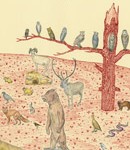 Reviewed by Jeff Latosik
Reviewed by Jeff Latosik
Crabwise to the Hounds
Jeramy Dodds
Coach House Books, 2008
80 pages, $16.95
Wallace Stevens famously quipped, “A poem need not have a meaning and like most things in nature often does not have.” While such a sentiment may do little to win over those who desire a clear raison d’être for their poetry, Stevens’ words do contain an elegant implication: a poem is a “thing in nature” and, as such, is experienced as the world is experienced, with all its attenuating surfeit, mystery, strangeness and contradiction.
It seems to me that Stevens’ words — and for that matter, the playful, aphoristic element of his work — is one point of entrance into Jeramy Dodds’ superlative Crabwise to the Hounds, a book that seems very comfortable in letting go of the impulse to “mean” something. Rather, Crabwise gives in to the rich musical resources and evocative potential of language to achieve its consistent, surprising and often profound effects. Though the book’s tonal register shifts between the hip (“Prosthetics”), colloquial (“The Epileptic Accupuncturist”) and high-minded (“Sable-Island Concertina, Circa 1887”), and its subject matter the domestic (“The Shower Caper”) exotic (“Sound Advice”) and arcane (“Square Grand Piano Circa 1880”), the focus of the book is sound and cadence, something at once primitive, guttural and yet elegant and civilized. These tensions play out within the work and are reflected in an emphasis on antiquated cultural artifacts and animal/elemental imagery. It is the mixture of these often contradictory subjects that gives the book its unique thrust.
It would be too simple, though, to call what Dodds is doing “language poetry” (whatever that means). Though rhythm, musicality and metre figure prominently in Crabwise, Dodds often reigns in image and subject matter in a way that allows him to “zoom in” with deft precision, as a camera’s lens is able to “shift” between the specific, semi-symbolic (or “resonant”) moment and the larger impressionistic landscape. Thus he is able to give us the lines:
Ear to a conch, I hear
acrobats in waiting rooms
flipping through magazines,
the gull squawk of the guitarist’s hand
going to chord, stunt men falling
through awning after awning.
The sea is a soliloquy
in a buried warehouse.
This, to me, is Dodds at his very best, and Crabwise is full of these gems. Several seemingly disjointed associations build energy and work toward a charged totality that equals more than its component parts. This poem has an Ashberian ring to it in its use of disjointed and seemingly unrelated lines, each populated by anachronistic phrasings and images. However, as many of the poems in Crabwise, Dodds is builds a momentum through his deployment of pitch-perfect language and surreal metaphors. The internal rhyme is impeccable, with the guttural “oh,” “uh” and “aw” sounds running in counterpoint alongside the cooler, detached “ee.” We sense the limberness of the stanza with the mention of “acrobats” and the quasi-onomatopoeic verb “flipping.” Then the stanza drops off from itself as “stunt men” begin “falling.” The final two lines here communicate a lingering tension between culture and amorphous, primordial instinct — between the perceiver and the “real” world that is perceived. All of this builds on itself and, though it is incredibly sharp, leaves enough space for the reader to enter and fill in the gaps as they will.
Whether Dodds is intentionally layering his acrobatic voice with these resonances or not is unimportant: the idea is his instinct is sharp; he creates the conditions on which this kind of close analysis can thrive. But Dodds also takes larger risks, and Crabwise possesses many moments that deploy a particularly difficult line. Take the opening of “The Gift”:
The streets flooded by people watching an apartment on fire.
The Klu Klux Klan white dress she wore. The weather’s rigamorole.
The silver hero in the clouds. The galvanizing. The franchise.
The bright backwash. The hollow village. The weather’s rebuttal.
The throat-cut rooster its beak wide with crow.
Here we see a particularly dissociative set of images, perhaps the most extreme example in the book, of Dodds’ use of language to build a kinetic momentum. The poem mimics the claustrophobia and frenzy of an apartment on fire through its unrelenting syntax and fragmented sentence construction. Continuing without stanzas and repeating “The X” over and over in almost incantatory fashion, this level of density, the leaps of association encountered here, might be alienating for those who appreciate a conversational line. However, “The Gift” also represents a kind of brazen playfulness, a sheer joy in letting go of the poem and letting linguistic energy take over. Like Blake’s tigers “burning bright,” the poem is not about anything as much as it is trying to capture a certain feeling of sublime power and awe. All this is to say that even at his most difficult, Dodds is interesting and arresting.
Newly minted as a finalist for the Griffin Poetry Prize and Gerald Lampert Award, Crabwise to the Hounds is beginning to garner the public attention it deserves. It is a landmark work of Canadian poetry and deserves to be considered closely. If Dodds wins the Griffin, I don’t think anyone will object (I know I won’t). But, more importantly, the true merit of a work lies in its ability to stand the test of time. And I’d gladly put my money on Dodds here.
Jeff Latosik is living in the “main floor apartments of the night” somewhere in Toronto. His first book will appear in spring 2010, courtesy of Insomniac Press.






